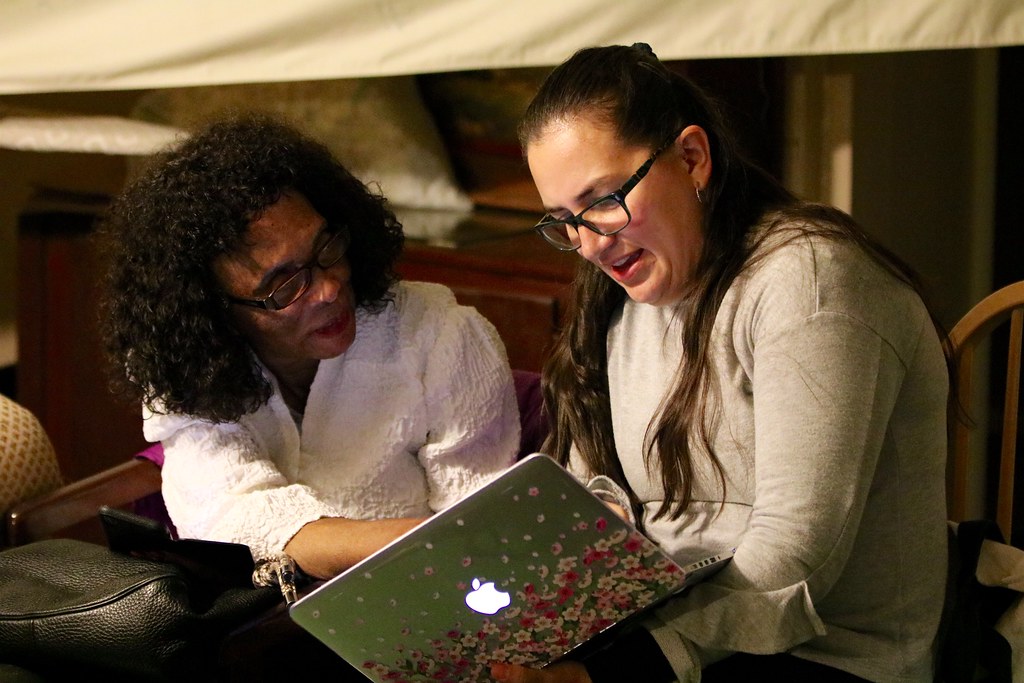
Bearing Witness
UW Tacoma Professor Marian Harris and graduate student Zea Mendoza recently spent a week helping asylum seekers held at the South Texas Family Residential Center.
This Section's arrow_downward Theme Info Is:
- Background Image: ""
- Theme: "light-theme"
- Header Style: "purple_dominant"
- Card Height Setting: "consistent_row_height"
- Section Parallax: ""
- Section Parallax Height: ""
The images were disturbing. Immigrant women and children wrapped in thin Mylar emergency blankets to stay warm. News reports of kids taken from their parents and housed in cages. The coverage produced a visceral response in UW Tacoma Professor Marian Harris. She had to do something.
Harris has spent most of her professional life helping the most vulnerable both in the United States and elsewhere. Harris’ research focuses on the children of incarcerated parents. She’s a licensed social worker and former chair of the Public Policy Council, Children’s Alliance of Washington. In 2018, the National Association of Social Workers, Washington Chapter named Harris its Social Worker of the Year. Harris is grateful for the honors but that’s not why she does what she does.

“Being able to help those who need it — to me, that’s what being a social worker is about,” said Harris. There isn’t much distinction between Harris’ personal and professional life. Indeed, her life’s work is assisting others, whether that’s a client or a student. In this context, “punching a clock” isn’t possible because, for Harris, there is no clock.
Back to those images, those stories splashed across television screens and newspapers. Harris got involved with the CARA Family Detention Pro Bono Project. The University of Washington School of Social Work and the Department of Social Welfare at the UCLA Luskin School of Public Affairs organized a service trip to the South Texas Family Residential Center in Dilley, Texas through CARA. The facility is the largest family detention center in the United States.
Harris and UW Tacoma graduate student Zea Mendoza spent a week in Dilley helping asylum seekers prepare for their credible fear interviews. In these interviews, asylum seekers appear before a judge and argue why they either face a “credible fear of persecution” or “credible fear of torture” if they are returned to their home countries.
Harris and Mendoza talked about their experience at the facility on the new UW Tacoma Podcast — Paw’d Defiance. Here are some excerpts. (Interview edited and condensed for clarity.)
Maria Crisostomo, Paw’d Defiance Host: What kind of work did you do at the facility?
Zea Mendoza: Basically, we helped clients that we chose from a list to prepare for their credible fear interview, which it is a situation where these women have to describe why they left their countries, why they were persecuted, why they didn't get help from their governments and why they are afraid to come back.
These women are so traumatized and the stories are so long, are so complex, that sometimes they are not able to articulate all these facts in a logical order and the only way they can, you know, make sense of their own stories is with the help of volunteers. Our job was to help them to prepare for this interview by listening to their stories and highlighting the areas that might be important for the court to hear. This project processes around 500 women a week. So, basically our job is to prepare one client every two hours on average, which is kind of a challenge because their stories are so long and so complex.
Hearing all these stories is very impactful and as an interpreter, you know, these mothers were talking to me and looking at me because they knew that I was the one that could understand their language. I felt like I was getting most of the trauma directed to me because they were crying and looking at me.
Crisostomo: What sorts of things did you experience while you were there?
Marian Harris: Our first interview that we did, we did together. After the interview, I broke down and cried and the reason was it basically traumatized me. I was very upset after listening to the mother. She told us her story of coming from a country in Central America to our country and all of the difficulty that she had prior to arriving at the family residential facility in Dilley. She told us about being caged literally with 29 other people, men and women, and little children, in a cage together for four days without food, without water — and that to me was just devastating. Having been born and reared in this country, it was just very hard for me to imagine that human beings could do that to another human being, to deny anyone food or water. We have lots of food and water in this country, including at the border and to deny a child a drink of water — that, to me, is just inhumane.
Crisostomo: How did you choose who you would help? Was there a list?
Harris: There is a list. However, the afternoon of the first day, I was asked if I would do a psychological [evaluation] the next day and I said yes. This was a special case. It was a woman who had gone before the judge two times and he had denied her requests to seek asylum both times and so I knew that what I wrote in my psychological, her life depended on it.
Crisostomo: What happened to her?
Harris: As I stated this woman had gone to court twice and received a negative ruling on her request to seek asylum. I asked Cindy, the attorney who was representing her, to please let Zea and I know the decision of the judge. We left on Saturday to come back here and the hearing was going to be on that Monday after we got back. Otherwise, I would have gone to the hearing if it had been during the week that we were there. I was sitting at my desk [in her office on campus] and turned my computer on and there was an email stating, “Thank you. The judge read the first narrative page of your psychological and stated that he did not need to read anymore and he gave a positive ruling.” I have to say I was by myself in my office and I cried because for me it meant that I had changed somebody's life in a positive way and that's what social work is all about.
Recent news
Main Content
Gathering Strength
News Tags on this arrow_upward Story:
- None
Main Content
UW Tacoma Enrollment up 4% for Autumn 2024
News Tags on this arrow_upward Story:
- None
Main Content
Celebrating First Gen
News Tags on this arrow_upward Story:
- None



